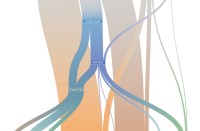https://youtu.be/eLRtQnOmbI0
CAPE TOWN, South Africa (AFP) — Models strutted the ramp with adhesive glittering rhinestones stuck around their mouths arranged in the shape of surgical face masks as the coronavirus pandemic took centre stage at a fashion week in Cape Town.
Veteran South African designer Gavin Rajah on Thursday night used the stage at the African International Fashion Week in Cape Town, to highlight to the division and potential racism that protective surgical masks may spur.
Models also donned plastic sheets covering their heads and face, mimicking the protective hazmat suits usually worn by medics working in infectious diseases hospitals.
“The use of the mask is very kind of symbolic because the mask isn’t really about necessarily protecting you, but what its going to do, is alienate you from the rest of the people around you,” Rajah told AFP.
“It’s going to set you apart. It’s a new form of racism”.
Since the deadly outbreak of the virus – known officially as COVID-19 — originated in China in December, Asian communities around the world have been subjected to suspicion and fear.
“We’re trying to create a form of expression and turn something which is negative into a form of something which is beautiful,” said Rajah.
In the world’s fashion hub of Italy, which is one the hardest hit countries, Chinese tourists have reportedly been spat at in Venice and mothers in Milan have used social media to call for children to be kept away from Chinese classmates.
In Malaysia, a petition to “bar Chinese people from entering our beloved country” received almost 500,000 signatures in one week.
Rajah, who is celebrating 20 years in the fashion industry said he didn’t want to leave a legacy only of only pretty dresses.
“We want to acknowledge the humanity in the people next to us and around us. And we want to champion those rights,” he said.
South Africa has registered 16 cases of the virus which has killed nearly 5,000 and infected more than 130,000 people as the virus sweep across the world.
© Agence France-Presse








